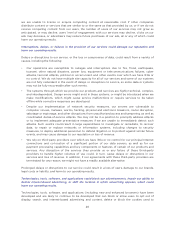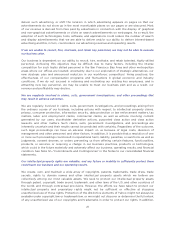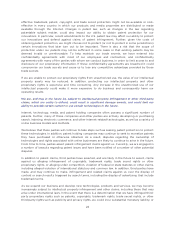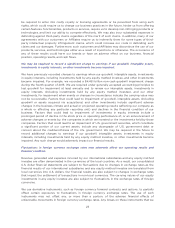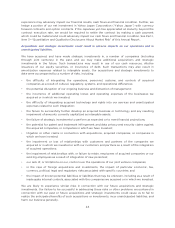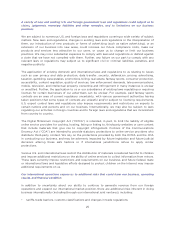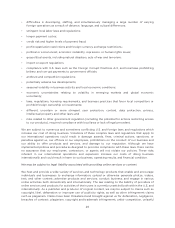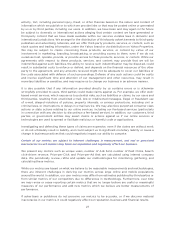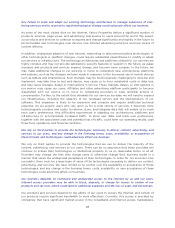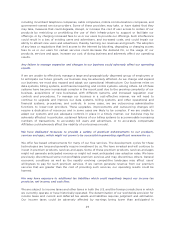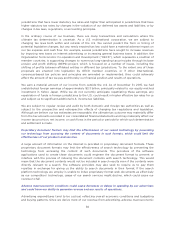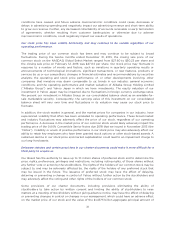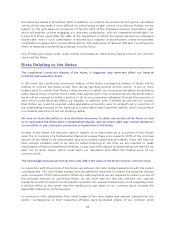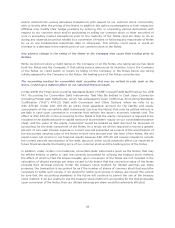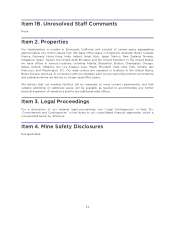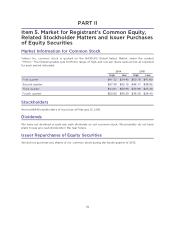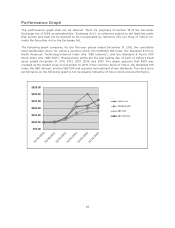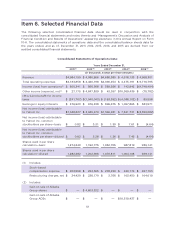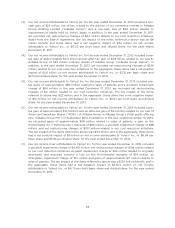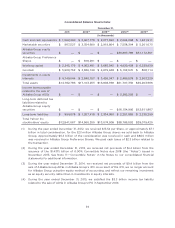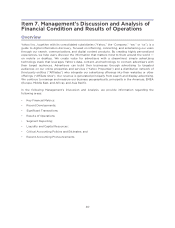Yahoo 2015 Annual Report Download - page 34
Download and view the complete annual report
Please find page 34 of the 2015 Yahoo annual report below. You can navigate through the pages in the report by either clicking on the pages listed below, or by using the keyword search tool below to find specific information within the annual report.jurisdictions that have lower statutory tax rates and higher than anticipated in jurisdictions that have
higher statutory tax rates, by changes in the valuation of our deferred tax assets and liabilities, or by
changes in tax laws, regulations, or accounting principles.
In the ordinary course of our business, there are many transactions and calculations where the
ultimate tax determination is uncertain. As a U.S. multinational corporation, we are subject to
changing tax laws both within and outside of the U.S. We cannot predict the form or timing of
potential legislative changes, but any newly enacted tax law could have a material adverse impact on
our tax expense and cash flow. For example, several jurisdictions have sought to increase revenues
by imposing new taxes on internet advertising or increasing general business taxes. In addition, the
Organization for Economic Co-operation and Development (“OECD”), which represents a coalition of
member countries, is supporting changes to numerous long-standing tax principles through its base
erosion and profit shifting (BEPS) project, which is focused on a number of issues, including the
shifting of profits between affiliated entities in different tax jurisdictions. To the extent any of these
proposals are enacted into legislation by OECD member countries, or if other international,
consensus-based tax policies and principles are amended or implemented, they could adversely
affect the amount of tax we pay and thereby our financial position and results of operations.
We earn a material amount of our income from outside the U.S. As of December 31, 2015, we had
undistributed foreign earnings of approximately $3.3 billion, principally related to our equity method
investment in Yahoo Japan. While we do not currently anticipate repatriating these earnings, any
repatriation of funds in foreign jurisdictions to the U.S. could result in higher effective tax rates for us
and subject us to significant additional U.S. income tax liabilities.
We are subject to regular review and audit by both domestic and foreign tax authorities as well as
subject to the prospective and retrospective effects of changing tax regulations and legislation.
Although we believe our tax estimates are reasonable, the ultimate tax outcome may materially differ
from the tax amounts recorded in our consolidated financial statements and may materially affect our
income tax provision, net income, or cash flows in the period or periods for which such determination
and settlement is made.
Proprietary document formats may limit the effectiveness of our search technology by preventing
our technology from accessing the content of documents in such formats, which could limit the
effectiveness of our products and services.
A large amount of information on the Internet is provided in proprietary document formats. These
proprietary document formats may limit the effectiveness of search technology by preventing the
technology from accessing the content of such documents. The providers of the software
applications used to create these documents could engineer the document format to prevent or
interfere with the process of indexing the document contents with search technology. This would
mean that the document contents would not be included in search results even if the contents were
directly relevant to a search. The software providers may also seek to require us to pay them
royalties in exchange for giving us the ability to search documents in their format. If the search
platform technology we employ is unable to index proprietary format web documents as effectively
as our competitors’ technology, usage of our search services might decline, which could cause our
revenue to fall.
Adverse macroeconomic conditions could cause decreases or delays in spending by our advertisers
and could harm our ability to generate revenue and our results of operations.
Advertising expenditures tend to be cyclical, reflecting overall economic conditions and budgeting
and buying patterns. Since we derive most of our revenue from advertising, adverse macroeconomic
30


